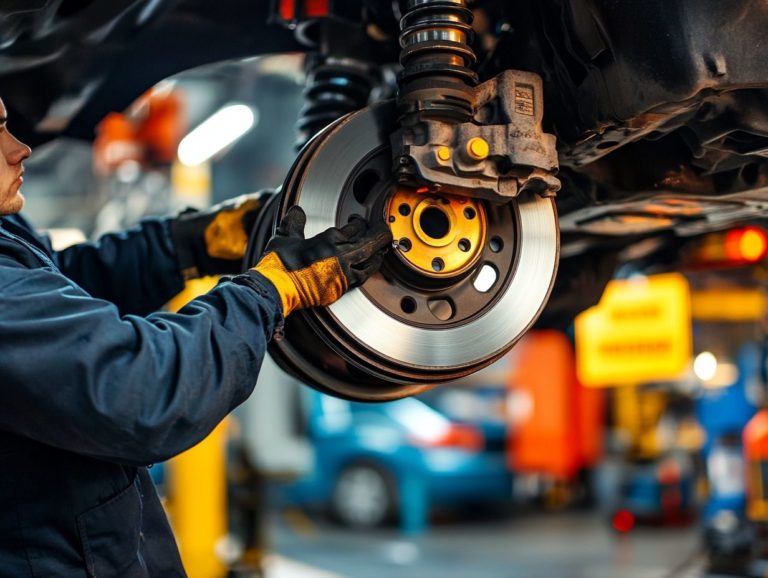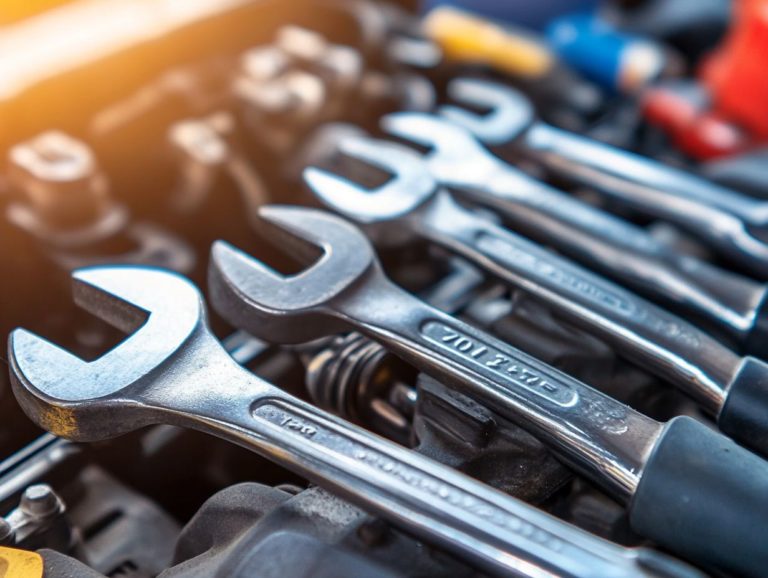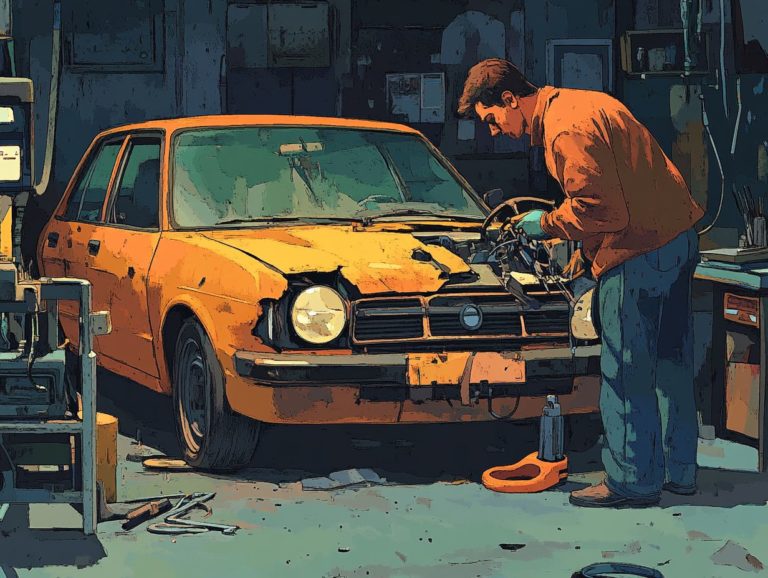How to Manage Common Car Repairs on a Budget
Cars play a crucial role in your daily life. Managing their repairs can feel overwhelming, especially when finances are tight.
By familiarizing yourself with common car issues, you’ll be better equipped to determine when a DIY approach is feasible and when it s wiser to consult a professional. This knowledge can save you both time and money.
Get ready to explore practical strategies for budget-friendly car repairs! This article offers valuable tips on cost-effective solutions and highlights the importance of regular maintenance to prevent expensive breakdowns.
Uncover how to maintain your vehicle s performance without straining your wallet!
Contents
- Key Takeaways:
- Identifying Common Car Issues
- DIY vs Professional Repairs
- Cost-Effective Repair Strategies
- Preventive Maintenance for Cost Savings
- Frequently Asked Questions
- What are some common car repairs that can be managed on a budget?
- How can I save money on car repairs?
- Can I negotiate the price of a car repair?
- Should I opt for aftermarket parts to save money on car repairs?
- Can I prevent common car repairs from happening?
- What should I do if I can’t afford a necessary car repair?
Key Takeaways:
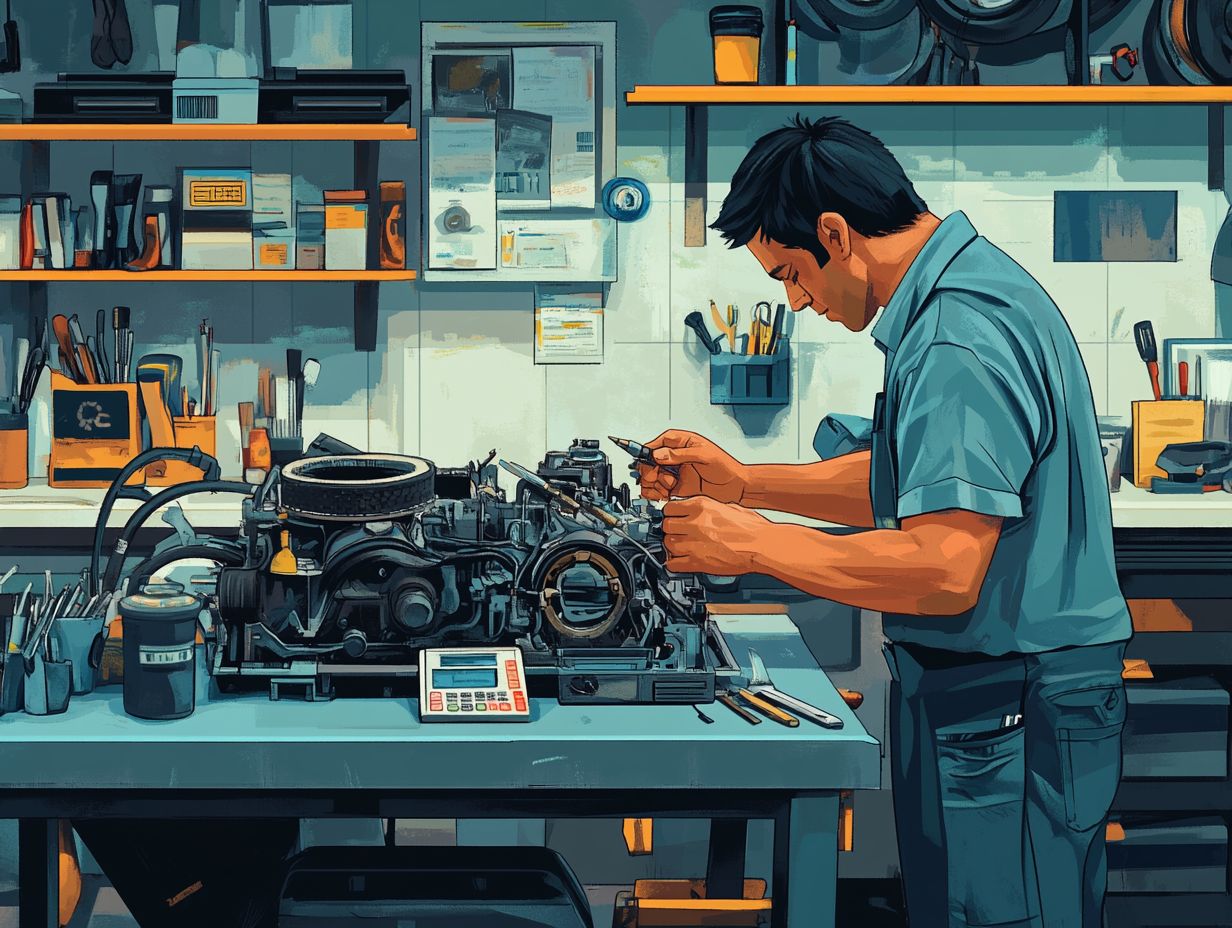
- Regular maintenance is key to avoiding costly repairs. Stay on top of your car’s maintenance schedule to save money in the long run.
- Know when to DIY and when to call a pro. Attempting complex repairs yourself could end up costing you more.
- You can save money on repairs through cost-effective strategies like shopping around for parts and negotiating labor costs. Don’t hesitate to ask for discounts or find cheaper alternatives.
Why Budget Car Repairs are Important
Budgeting for car repairs is essential for you as a vehicle owner. It enables you to manage unexpected repairs while ensuring financial stability, especially when you understand the most common vehicle repairs.
By anticipating costs associated with routine maintenance tasks, like oil changes and transmission replacements, you can set aside the right funds for these unavoidable expenses. A well-structured budget should cover regular service intervals and include a cushion for unexpected situations, such as a sudden brake failure or engine trouble.
This financial buffer allows you to handle car problems calmly. Establishing a clear financial plan for your vehicle s upkeep encourages timely maintenance and enhances its longevity and performance.
Ultimately, this leads to lower overall repair costs in the long run.
Identifying Common Car Issues
Identifying common car issues is essential for maintaining your vehicle’s health and optimizing repair expenses. By being proactive, you can prevent minor problems from snowballing into expensive repairs.
Regular check-ups and a solid understanding of your vehicle’s components like the catalytic converter (the part that helps reduce harmful emissions), ignition coil, and brake pads position you to stay ahead of potential breakdowns. Paying attention to signs such as unusual noises, warning lights, and changes in performance allows you to address concerns promptly.
These actions ensure both the safety and longevity of your car.
Signs and Symptoms to Look Out For
Being aware of the signs and symptoms that indicate potential car issues is crucial for effective troubleshooting and timely repairs. For example, if you hear strange noises when braking, it might be a red flag for worn-out brake pads. Difficulty starting could hint at problems with the ignition coil or spark plug.
By recognizing these early warning signs, you can address your vehicle’s repair needs before they escalate, making it easier to stay on top of maintenance tips and manage associated expenses.
Routine checks can unveil visible signs, such as fluid leaks under your car, which may suggest issues with hoses or gaskets. Uneven tire wear often points to misalignment or suspension problems.
Paying attention to these visual cues, along with auditory symptoms like a persistent grinding noise or a rattling sound when you accelerate can provide vital hints about underlying issues.
By being proactive and adhering to a consistent maintenance schedule, you can prevent minor problems from evolving into major repairs. This keeps your vehicle running smoothly and reduces unexpected expenses over time.
DIY vs Professional Repairs
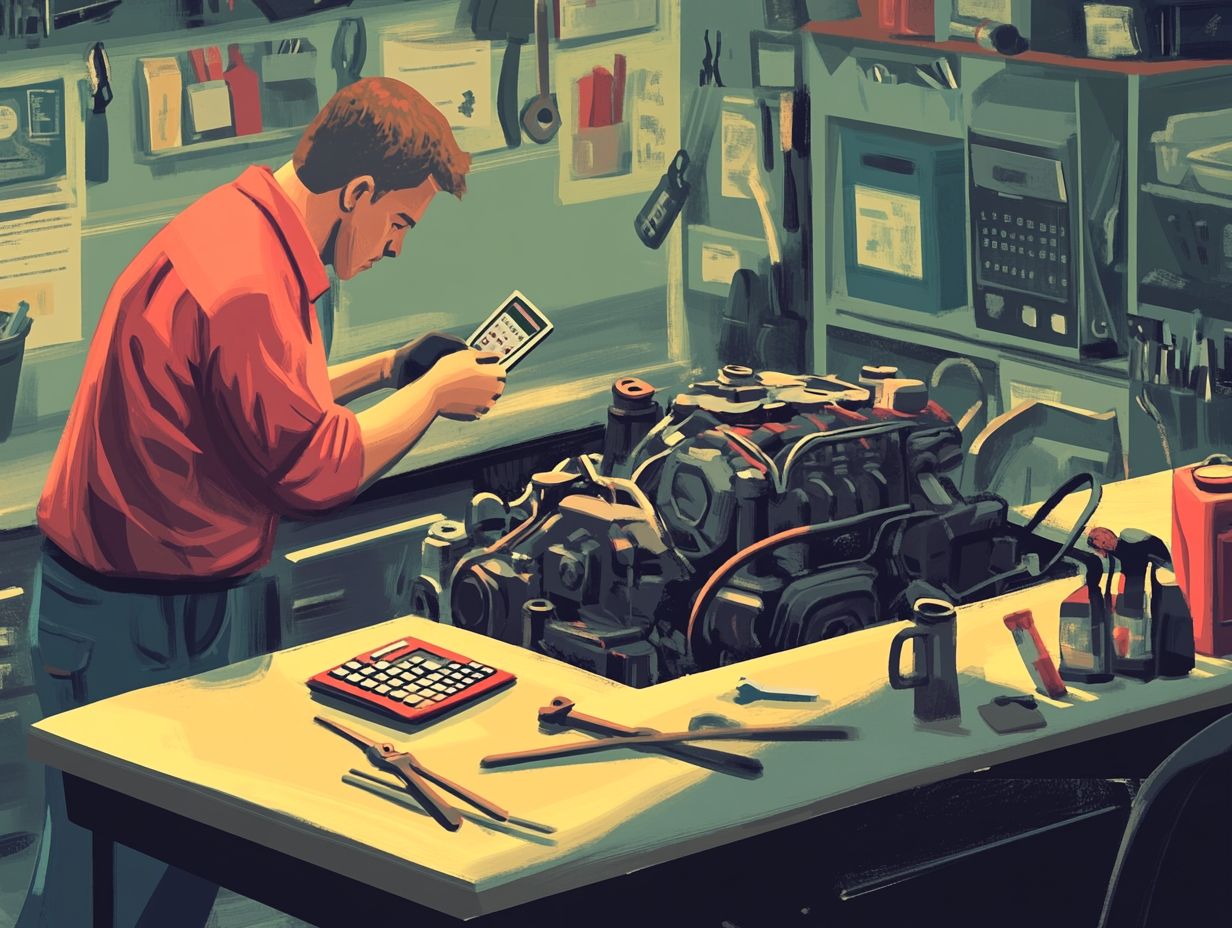
Navigating car repairs requires a keen understanding of when to roll up your sleeves for DIY fixes and when to call in the professionals, especially if you re looking to manage maintenance costs effectively.
You might find yourself weighing the joys of tackling simple tasks like oil changes and tire rotations against the need for expert services when faced with more difficult issues such as transmission replacements or catalytic converter failures.
By assessing potential repair quotes and recognizing the value of a well-structured maintenance schedule, you can make informed decisions that align with both your budget and level of expertise.
When to Attempt Repairs Yourself
Knowing when to roll up your sleeves and tackle repairs on your own can not only save you some cash but also elevate your car maintenance routine. Simple tasks like oil changes, tire rotations, and air filter replacements are perfect for the DIY approach. Engaging in these repairs fosters a deeper understanding of your vehicle, enabling you to handle common issues effectively.
Be sure to check your skill level first! This way, you can avoid unnecessary headaches diving into complex components like the catalytic converter or ignition coil without the right know-how might lead to more problems than solutions.
For those eager to take on these manageable tasks, arming yourself with the right tools is essential. Think wrenches, jacks, and screwdrivers. Don t underestimate the value of a trusty repair manual or online videos; they can guide you through the process with ease.
Starting with oil changes is a smart move; not only do they enhance engine health, but they also build your confidence as a DIY mechanic. Tire rotations are straightforward and promote even tire wear, boosting traction in the process. Replacing air filters is another worthwhile endeavor, significantly improving air quality inside the cabin and enhancing engine efficiency.
However, if you encounter more intricate systems or unfamiliar parts, it s wise to seek professional help to avoid potentially costly mistakes.
When to Seek Professional Help
Don t wait to seek professional help your safety depends on it! Knowing when to seek professional assistance is key, especially for difficult repairs that can significantly impact your vehicle’s performance and safety, such as transmission replacements or fuel injector issues. While tackling some repairs on your own can save you money, certain situations necessitate the expertise of professionals to prevent unexpected costs arising from DIY misadventures.
Create a maintenance schedule to know when your car needs professional help, keeping you ahead of potential repair expenses. Common scenarios like electrical problems, brake system failures, or engine malfunctions require specialized knowledge and tools that most car owners simply don t have.
When searching for reliable repair shops, look for those with positive reviews and appropriate certifications; these are often good indicators of quality service.
Evaluating repair costs means understanding service fees, the price of necessary parts, and any warranty offers. Always request a detailed estimate upfront to ensure that your investment is both fair and transparent.
Cost-Effective Repair Strategies
Finding smart ways to save on repairs can make a big difference! Implementing cost-effective repair strategies is crucial for managing your repair expenses while keeping your vehicle in impeccable condition, especially if you’re aware of the top 10 most common car repairs you should know when unexpected repairs or maintenance arise.
Get repair quotes from several providers to uncover potential savings and take advantage of repair discounts, enabling you to allocate your maintenance budget more effectively.
Familiarizing yourself with various savings strategies enables you to make informed decisions without sacrificing safety or quality.
Tips for Saving Money on Parts and Labor
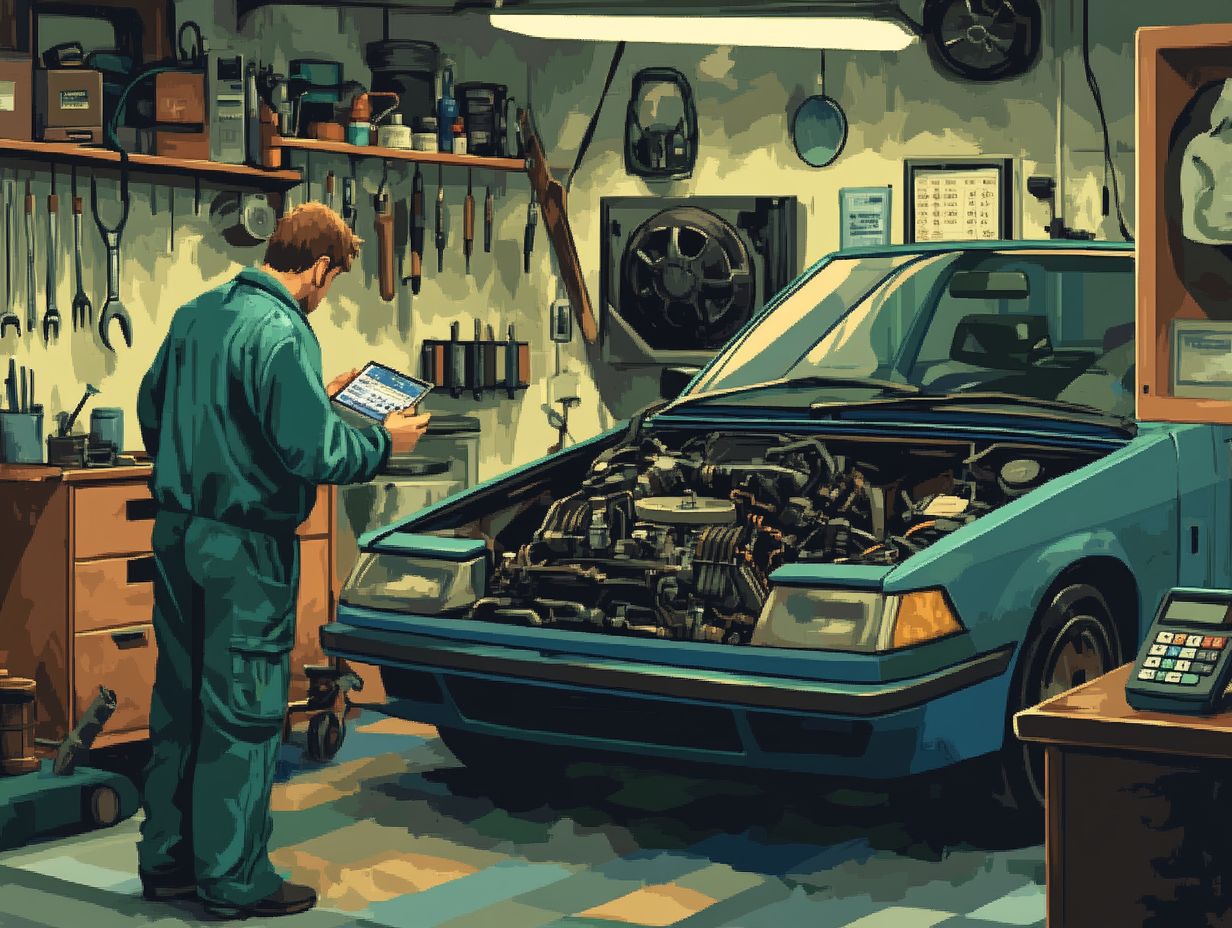
Saving money on parts and labor is essential for you as a vehicle owner. It allows you to manage repair costs effectively while maintaining quality.
By being strategic and well-informed, you can navigate the often daunting world of car repairs. This way, you can approach it with much more confidence.
One effective tactic is to compare repair discounts offered by different services. Select the best value for the parts and labor you need.
When you purchase parts directly from trusted stores, you can cut costs further. This ensures that your repairs are both economical and effective.
It s wise to research local repair shops, read customer reviews, and seek recommendations. This helps you identify trustworthy services that offer competitive pricing.
Staying informed about seasonal promotions and bulk purchase discounts can help you save significantly. This enables you to keep your vehicle in excellent condition without straining your wallet.
Preventive Maintenance for Cost Savings
Preventive maintenance is essential for saving money on future repair costs. It tackles common issues before they evolve into significant problems.
By establishing a thorough maintenance schedule, you ensure regular check-ups and timely services. These include oil changes and brake inspections that unveil potential repair needs early on.
By taking a proactive approach, you can significantly reduce the risk of unexpected repairs. This also extends the lifespan of your vehicle and elevates its overall performance.
How Regular Maintenance Can Help Avoid Expensive Repairs
Regular maintenance is your best ally for sidestepping expensive repairs. It lets you tackle minor issues before they escalate into costly problems.
By scheduling regular check-ups, you can catch worn-out components like brakes or belts. This prevents them from wreaking havoc and leading to hefty repair bills.
Adopting a structured maintenance regime boosts your vehicle s performance and longevity. It also enhances fuel efficiency, translating into savings over time.
These proactive practices can elevate your automobile’s resale value. Consistent care creates a smoother, safer driving experience while keeping unexpected costs firmly at bay.
Frequently Asked Questions
What are some common car repairs that can be managed on a budget?
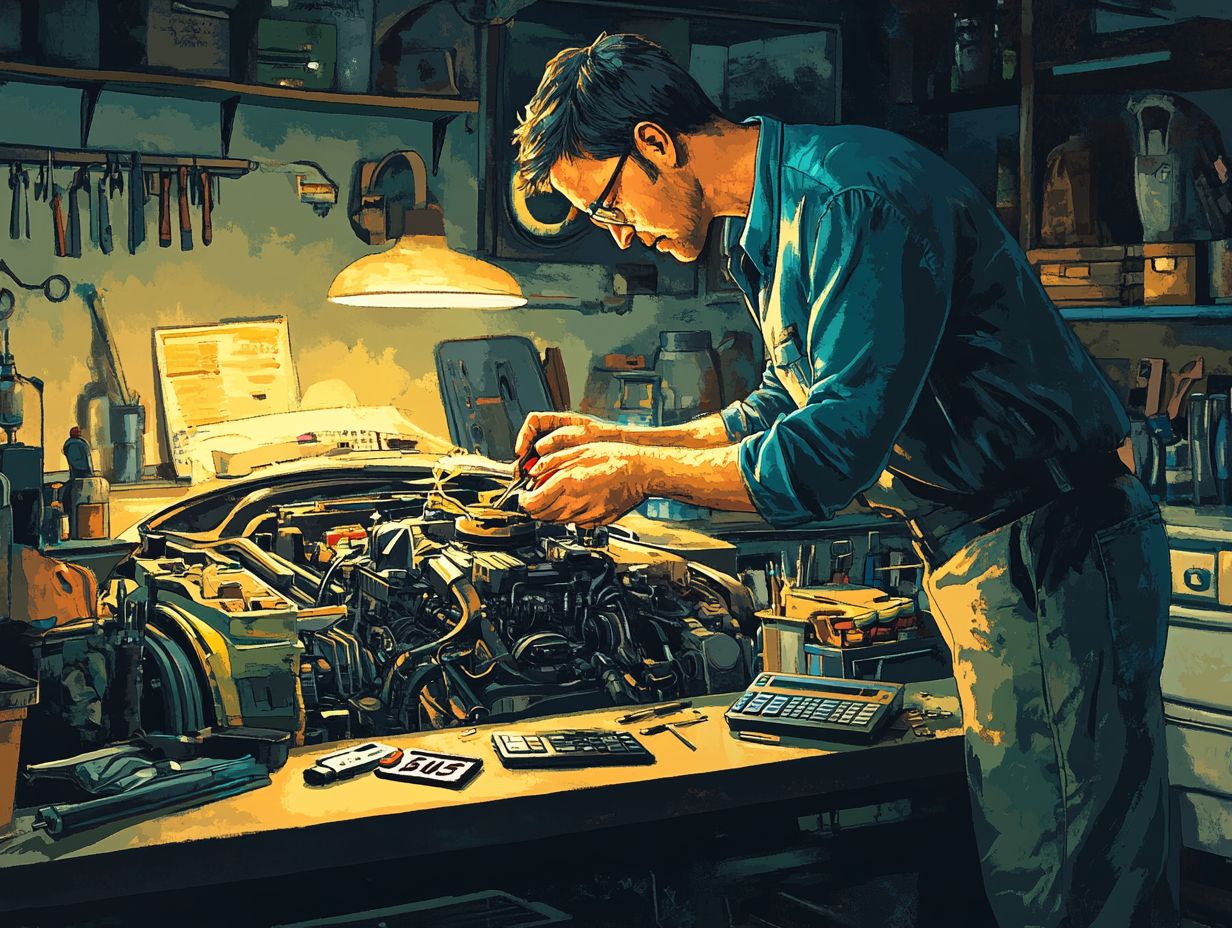
Common car repairs that can be managed on a budget include oil changes, brake pad replacements, tire rotations, spark plug replacements, and how to stay prepared for common car repairs like air filter changes.
How can I save money on car repairs?
To save money on car repairs, try DIY repairs. Additionally, shop around for the best prices, use coupons or discounts, and check out understanding common car repair costs to help you prevent major issues by maintaining your car.
Can I negotiate the price of a car repair?
Yes, you can negotiate the price of a car repair. Be sure to get quotes from different mechanics to use as leverage for a lower price with your chosen mechanic.
Should I opt for aftermarket parts to save money on car repairs?
It ultimately depends on the situation. Aftermarket parts may be cheaper, but they might also be of lower quality and not last as long as OEM (original equipment manufacturer) parts, which are made by the car’s original manufacturer. Consider researching the brand and reviews before opting for aftermarket parts.
Can I prevent common car repairs from happening?
While some car repairs are inevitable over time, others can be prevented by maintaining your vehicle properly. This includes regular oil changes, tire rotations, and tune-ups, along with watching for any warning signs of potential issues.
What should I do if I can’t afford a necessary car repair?
If you can’t afford a necessary car repair, try negotiating a payment plan with your mechanic. Consider seeking a second opinion for potentially more affordable solutions. You can also research resources for low-income individuals that offer discounted or free car repair services.

